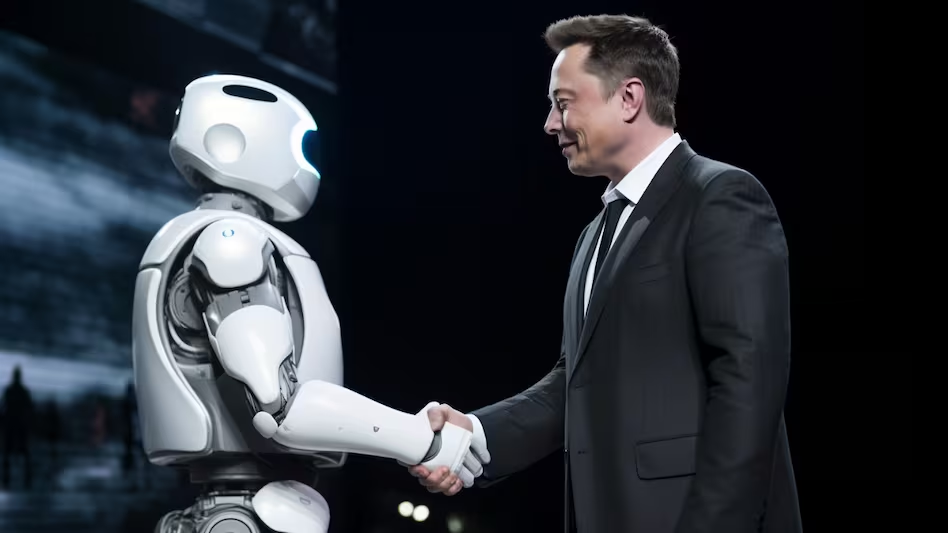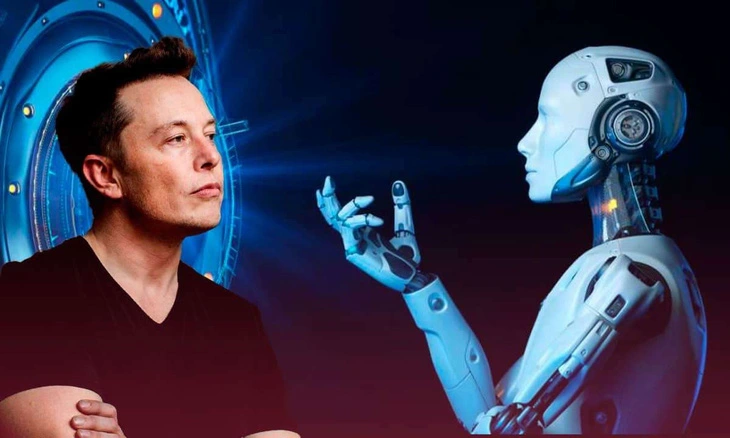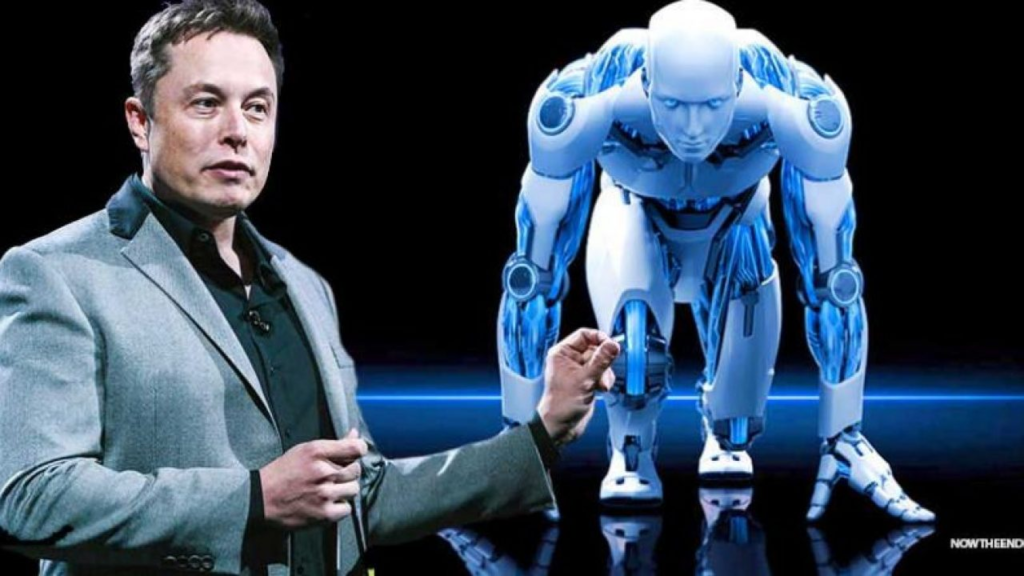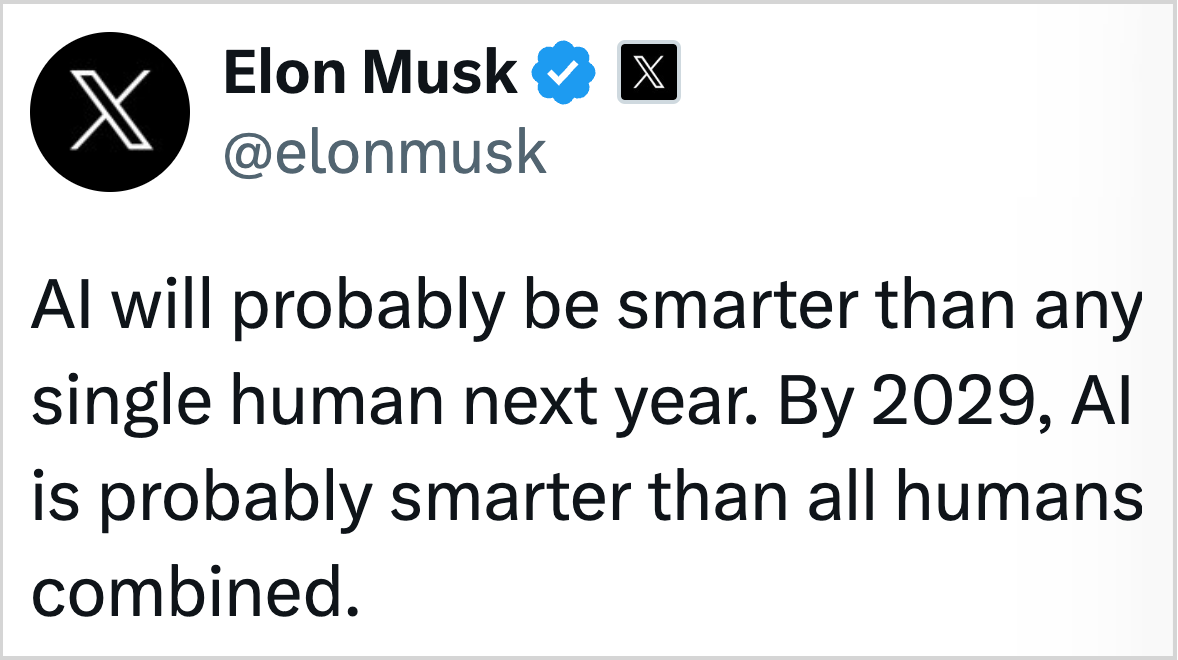The possibility of artificial intelligence (AI) surpassing human intelligence has fascinated and unsettled humanity for years. Recently, with advances in generative AI models like ChatGPT, the debate over whether AI can replace human abilities has become more urgent and realistic.
Major tech giants such as Google, Meta, Amazon, and Microsoft are heavily invested in developing their own AI systems, creating fierce competition in the field of AI research and development. Amid these developments, Elon Musk, CEO of Tesla and SpaceX, has boldly stated that AI will surpass human intelligence by 2029.
Musk’s belief aligns with predictions from futurists like Ray Kurzweil, who have long forecasted that AI will soon match, and eventually exceed, human intelligence. As this future rapidly approaches, the potential of AI to transform every sector of life is both exhilarating and concerning.
The Race to Create Super-Intelligent AI
The journey to achieving human-level artificial intelligence has been underway for decades, but recent advancements in machine learning, computational power, and data accessibility have accelerated the field’s progress exponentially.
OpenAI’s ChatGPT and similar language models have demonstrated unprecedented abilities to process natural language, understand context, and generate sophisticated responses. The success of generative AI has motivated other tech giants like Google, Meta, and Microsoft to redouble their efforts to develop their own language models and refine their AI platforms.
Read : Elon Musk Buys $35 Million Home for His 11 Children and Their Mothers
Elon Musk has been vocal about his views on AI’s potential, and his recent predictions that AI could surpass human intelligence by 2029 reflect his recognition of these rapid advancements.
Musk’s statement comes in response to ongoing discussions among experts who foresee AI reaching levels of capability that could rival human intelligence sooner than previously thought. During a recent conversation between podcaster Joe Rogan and futurist Ray Kurzweil, Kurzweil reasserted his earlier prediction that AI would achieve human-level intelligence by 2029.
Read : “I am an alien. Yeah, I keep saying I’m an alien, but nobody believes me”: Elon Musk
Both Kurzweil and Musk’s estimates suggest that in the coming years, AI will not only be able to mimic but potentially enhance and extend human cognitive abilities, marking a profound transformation in human history.
Musk’s prediction of AI surpassing human intelligence within this decade raises questions about how society will adapt to AI that can perform all human tasks, possibly even better than humans.
The belief that AI could match or exceed the intelligence of all humans combined by 2029 underscores the urgency with which technologists and society must grapple with AI’s capabilities, limitations, and ethical implications.
Ray Kurzweil’s 2029 Prediction and the Path of Technological Progress
Ray Kurzweil, a leading futurist and author, has been forecasting AI’s rise for decades. In his analysis, he observes that technology, particularly AI, is evolving at an exponential rate, driven by increased computational power, improved algorithms, and expanded data processing capabilities.
Since his initial prediction in 1999, Kurzweil has maintained that AI would reach human-level intelligence by 2029—a forecast that many initially dismissed as overly optimistic. Yet, as AI has rapidly advanced, experts now consider his projection plausible, if not conservative.

Kurzweil’s confidence in his prediction is grounded in his understanding of the exponential growth pattern observed in technology, often referred to as Moore’s Law. According to Moore’s Law, the number of transistors on a microchip doubles approximately every two years, resulting in an exponential increase in computing power.
This trend has allowed AI to become more sophisticated and versatile, capable of tasks that would have seemed impossible just a decade ago. Kurzweil believes this exponential growth will only accelerate, bringing AI to human-level intelligence and beyond by the end of this decade.
Interestingly, Kurzweil’s 2029 prediction aligns closely with Musk’s views, even as Musk suggests that AI could surpass the collective intelligence of humanity. While some experts believe it could take over a century for AI to reach this level, Kurzweil and Musk argue that advancements in AI may bring it much sooner.
If AI achieves human-level intelligence by 2029, as Kurzweil predicts, it could soon outpace humans in ways that could redefine industries, economies, and the very nature of human existence.
Opportunities and Risks of a World with Super-Intelligent AI
The potential for AI to surpass human intelligence is both thrilling and daunting. On the one hand, super-intelligent AI could transform sectors from healthcare to education, optimizing processes, solving complex problems, and even tackling global issues like climate change.
AI’s capabilities could revolutionize medical diagnosis, personalize learning for students, automate complex tasks in finance, and streamline manufacturing, leading to unprecedented efficiency and productivity.
Imagine AI systems that could instantly analyze massive datasets to develop new treatments for diseases, predict environmental disasters, or even contribute to artistic fields by creating innovative forms of art and literature.
However, the potential for AI to surpass human intelligence also raises significant ethical, social, and economic concerns. As AI systems become more powerful, there is a real risk that they could displace human workers across multiple industries, leading to widespread job displacement.

The automation of routine tasks may benefit certain sectors, but it could also create economic inequality, as those who control advanced AI systems accrue disproportionate wealth and power. Ensuring that the benefits of AI are equitably distributed across society will be crucial to avoiding social unrest and maintaining societal stability.
Moreover, the ethical implications of creating AI that can surpass human intelligence cannot be ignored. AI systems, unlike humans, do not possess empathy, moral judgment, or an intrinsic sense of right and wrong. As AI becomes more capable, there is a risk that it may act in ways that conflict with human values or interests.
This concern has led some experts, including Musk, to advocate for strict regulations and ethical guidelines to govern AI development. If left unchecked, AI could become an existential threat, capable of making decisions that could harm humanity on a massive scale.
Creating safeguards, such as robust regulatory frameworks and ethical standards, will be essential to ensuring that AI development proceeds in a manner that aligns with human well-being and moral values.
Preparing for a Future with Advanced AI
The prospect of AI surpassing human intelligence by 2029 demands that humanity take a proactive approach to address the associated challenges and opportunities. Governments, businesses, and educational institutions must work together to create policies that promote the responsible development and deployment of AI.
This includes investing in AI research that prioritizes safety, transparency, and accountability, as well as developing educational programs to prepare future generations for a world in which AI is ubiquitous.

Additionally, as AI systems become more advanced, fostering a public dialogue around their ethical implications is essential. Engaging a diverse range of voices—from technologists and ethicists to philosophers and policymakers—will help ensure that AI is developed in a way that respects human dignity and autonomy.
Prominent figures like Musk and Kurzweil have contributed to raising awareness about AI’s transformative potential, but a broad, inclusive conversation is necessary to shape the future of AI in a manner that benefits all of humanity.
AI could become humanity’s greatest asset if developed responsibly. By addressing its risks and ensuring it aligns with ethical principles, AI has the potential to empower individuals, enhance productivity, and solve some of humanity’s most pressing challenges. However, achieving this vision requires a commitment to careful planning, thoughtful policy-making, and an unwavering focus on ethical considerations.
Whether AI reaches human-level intelligence by 2029 or sooner, as Musk suggests, the rapid development of AI will undoubtedly redefine the future of humanity. As we stand on the brink of this transformation, it is up to society to harness the power of AI in a way that benefits all and ensures that AI remains a tool that serves humanity rather than a force that surpasses it.


I’ve read many articles on this subject, but yours offers something genuinely new. The fresh perspective and well-supported arguments make this a must-read for anyone interested in the topic.
丹佛约炮.按摩.找小姐.留学生兼职.援交.私人上门服务.东莞式服务
I’ve been following your blog for months and this article really stood out to me. Your perspective on this topic is refreshingly honest and I appreciate how you didn’t shy away from addressing the difficult questions. Looking forward to reading more from you! Video tutorials can be accessed through Free Platform.
Our understanding is like a circle; what we know is inside, what we don’t know is outside. Every time we listen to different viewpoints, we expand the boundaries of that circle, allowing us to see more of the unknown and becoming more humble and enriched. Video tutorials can be accessed through QKJEJKR.
Random recommendation: https://kling3.app. processing speed lets you iterate on ideas rapidly. Would love to see where this goes next.